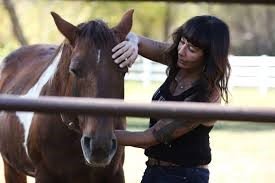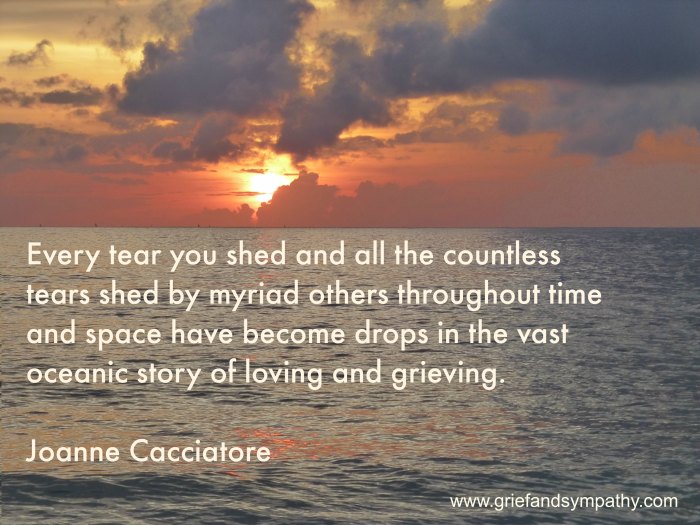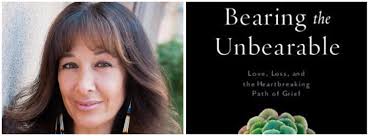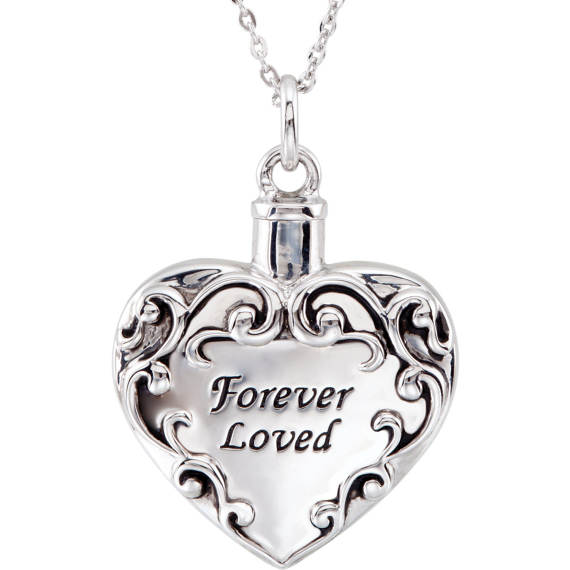Grieving Mindfully - the Joanne Cacciatore Way
Lesley Postle, editor of this website, looks into how mindfulness, led by researcher and trainer of therapists, Joanne Cacciatore, could become the forefront of bereavement therapy in the future and suggests some easy ways it can help you with your own grieving process.
 Joanne Cacciatore with her horse Chemokah
Joanne Cacciatore with her horse Chemokah"And when we allow ourselves to feel that which is legitimately ours to feel, we rebel against the rigid grief-denying structures of society." Joanne Cacciatore
Mindfulness and meditation are practices that have been around for thousands of years and are the foundation of religions such as Buddhism and practices such as Yoga. Far from being 'way out' practices that only yogis and rainbow clad hippies practice, mindfulness can be as simple as smelling a flower or sitting quietly with a cup of tea. You're probably practicing some of the techniques in your life already. So there is nothing to be afraid of in embracing mindfulness to help you on your grief journey.
Those of us who practice mindfulness are well aware of the benefits it can bring to our physical and mental well-being, but western medical science has been slow to catch up with this ancient wisdom.
Things are now changing and over the last couple of decades there has been a lot of research to show that meditation and mindfulness are effective in treating depression, PTSD, chronic pain and many other conditions.
Until recently however, no research had been undertaken into how this beautiful, ancient wisdom can benefit those who are struggling with grief. One woman, Joanne Cacciatore, is leading the charge to prove how mindfulness practices in therapy can help those who are coping with traumatic or complicated grief. Many of those practices are simple things which you can do yourself at home, whatever stage you are at in your grief journey, and we'll share some of them below.
Joanne had her own tragic experience of grief when she lost a child soon after birth. She realised pretty quickly that the culture in which we live is steeped in grief avoidance so that we are all expected to just 'get over' our grief within a fairly short period of time. No doubt you've experienced a lack of patience from friends and family who expect you to get on with your life and recover from your grief within a few short months. Most grievers have heard typical phrases such as 'just think positive' or 'surely you should be over that by now' which diminish and negate the love that you will always have for the one you lost. The time limit that society puts on grief can end up with you burying your true feelings and on top of that feeling guilt and shame when you can't cope or become overwhelmed.
For the last 20 years, Joanne Cacciatore has been working to change the way that grief is regarded in society and treated by professionals. She has worked tirelessly so that people like her, when she lost her child, can recover in their own time with compassionate and understanding support. She is now a Professor at Arizona State University and has published numerous papers (1) showing how mindfulness based interventions can help even those who are still struggling with their grief many years later.
Her work with those coping with traumatic or protracted grief has also led to her setting up a farm retreat full of rescued animals which she believes are the perfect beings to help those in trouble. Animals can be of great comfort to those who are grieving, as Joanne said of herself: "I used to say my dogs and my 3-year-old were the only beings that could stand to be around me without trying to change how I felt — without trying to cheer me up or make me better". She has called her retreat centre 'Selah' which in Hebrew means 'time to pause and reflect'.
The thing about grief which Joanne makes clear in what she said about animals, is that it is not a disease to be cured or made better. Those who grieve know that it will be with them for life. It's not a case of 'getting better' or 'getting over it' but of finding ways to live, ways to cope and eventually ways to find joy in life again, (alongside the grief, not instead of it). Animals can help with that.
It may well be a while before mindfulness practices become mainstream in the training of bereavement therapists, (Joanne is busy training as many therapists as she can) but there are many things which you can do yourself which will help you to face your grief and learn to live with it.
Mindfulness Practices that Can Help You with Your Grief
Mindfulness is not a complicated or difficult yogic practice that you need to learn from a guru. You don't have to learn how to meditate, although you can if you want. It is just a way of being in the present and getting in touch with your body and mind, feeling your feelings and acknowledging who you are, and where you are at any given moment. It's about accepting what is, and being with it.
It has been shown that burying grief through distractions, or worse numbing it with alcohol, drugs, sex or self-destructive activities can lead to physical and mental health issues (2). Unfortunately, extremely tough as it can be, there is no other way to deal with grief than to go through it, not around it. Some of the practices below can help you to start this process and be with yourself as you go through this painful time.
Mindfulness Practices to Help You Connect to Your Emotions
- Give yourself some quiet time every day. Just sit outside or somewhere peaceful with a cup of tea. It may be hard at first and confronting when feelings come up, but try and sit with it, listen to your heart and see where it takes you.
- Walking in nature - Joanne has developed what she calls 'barefoot hiking' which helps people to be present in the moment, outdoors in nature. Barbara E Thompson expresses it as re-building a connection to your environment and explains that getting in touch with your sense of oneness with the universe can help you to feel less alone. Some call it 'grounding', that feeling of being connected to the earth by walking barefoot on the grass, listening to the birds or feeling the wind in your hair.
I believe that this beautiful quote from Joanne's book 'Bearing the Unbearable' sums up the connection we all have to the rest of the world if we stop and tune into it:
"Every tear you shed and all the countless tears shed by myriad others throughout time and space have become drops in the vast oceanic story of loving and grieving."

- Being with animals - animals will never tell you to get over your grief, or give you unwanted advice about what you should be doing or trying. They accept you and are content to just be with you whatever your mood or state of mind. They can show us the way back to joy and how to live in the moment.
- Journaling. Writing can be very cathartic. One exercise is to just start writing. It doesn't have to make sense. It can be one word over and over, or nonsense. Just write. It can be surprising what comes out. If it's something precious you can keep it, or if it's something you want to let go, you can burn it or throw it away. See our page on different types of grief journaling.
- Whether you're artistic or not, drawing or playing with sand (3), or painting, or modelling with plasticine can be very mindful activities. It's not about changing your thoughts or doing a relaxation exercise, it's just about being and letting whatever comes up come up. There has been a new trend recently in adult colouring books, which is another mindful activity.
"Far from being selfish, in a way, self-care in acute grief is heroic." Joanne Cacciatore
- Self-care and compassion. Often we drive ourselves really hard and don't look after ourselves half as well as we look after other people. If you're coping with guilt or shame after your loss, you might not think you deserve it. But we all need love and compassion. Try and find it from those around you, but it's important to be kind to yourself too. That means looking after your health, finding time for nurturing activities that make you feel good. It might be having a long hot bath, having your nails done, or curling up by the fire. Try and do one self-nurturing activity a day. We have suggested some activities here.
"We cannot help another without also helping ourselves." Joanne Cacciatore
- Volunteering - helping others, even in the smallest of ways can be very cathartic. Even the smallest acts we can do to honour our loved one gives us meaning in the midst of our grief. Joanne Cacciatore started the Kindness Project which has helped millions of the bereaved to do something kind anonymously in the name of the loved one they have lost. You can read about the Kindness Project here.

Joanne Cacciatore is the author of 'Bearing the Unbearable - Love, Loss and the Heartbreaking Path of Grief'. You can read our review of her book here.
Refs:
(1) Joanne Cacciatore & Melissa Flint (2012) ATTEND: Toward a Mindfulness-Based Bereavement Care Model, Death Studies, 36:1, 61-82, DOI: 10.1080/07481187.2011.591275
(2) Neria, Y., & Litz, B. T. (2003). Bereavement by traumatic means: the complex synergy of trauma and grief. Journal of Loss and Trauma, 9, 73–87.
(3) Kalff D. (2003) Sand Play: A psychotherapeutic approach to the psyche. Cloverdale, CA: Temenos Press
Related Pages:
- Grief and Sympathy Home
- Self-Care
- Grieving Mindfully
Where to get help:
Have You Considered One-on-One Online Grief Counseling?
Get Expert and Effective Help in the Comfort of Your Own Home
The following information about online counseling is sponsored by 'Betterhelp' but all the opinions are our own. To be upfront, we do receive a commission when you sign up with 'Betterhelp', but we have total faith in their expertise and would never recommend something we didn't completely approve.
Do you feel alone and sad with no support and no idea how to move forward? It can be tough when you are stuck in grief to find the motivation to get the most out of your precious life.
Online counseling can help by giving you that support so you don't feel so alone. You can have someone to talk to anytime you like, a kind and understanding person who will help you to find meaning in life again, to treasure the memories of your loved one without being overwhelmed and to enjoy your activities, family and friends again.
- Simply fill out the online questionnaire and you will be assigned the expert grief counselor most suitable for you. It only takes a few minutes and you don't even have to use your name.
- Pay an affordable FLAT FEE FOR UNLIMITED SESSIONS.
- Contact your counselor whenever you like by chat, messaging, video or phone.
- You can change counselor at any time if you wish.
- Click here to find out more and get started immediately.
- Or read more about how online counseling works here.
Sales from our pages result in a small commission to us which helps us to continue our work supporting the grieving.
Hypnosis for Grief - 10 Ways It Can Help You
Try a gentle hypnotherapy track to relax the mind. Learn how self-hypnosis can help you cope with grief at any time of the day or night.

For Remembrance:
Sales from our pages result in a small commission to us which helps us to continue our work supporting the grieving.
Memorial Jewelry to Honour a Loved One
Check out our lovely range of memorial jewelry for any lost loved one. Pendants, necklaces, rings or bracelets, we have them all in all kinds of styles. Choose for yourself or buy as a sympathy gift.
Create an Online Memorial Website
Honour your loved one with their own memorial website. Share photos, videos, memories and more with your family and friends in a permanent online website. Free for basic plan with no ads.








